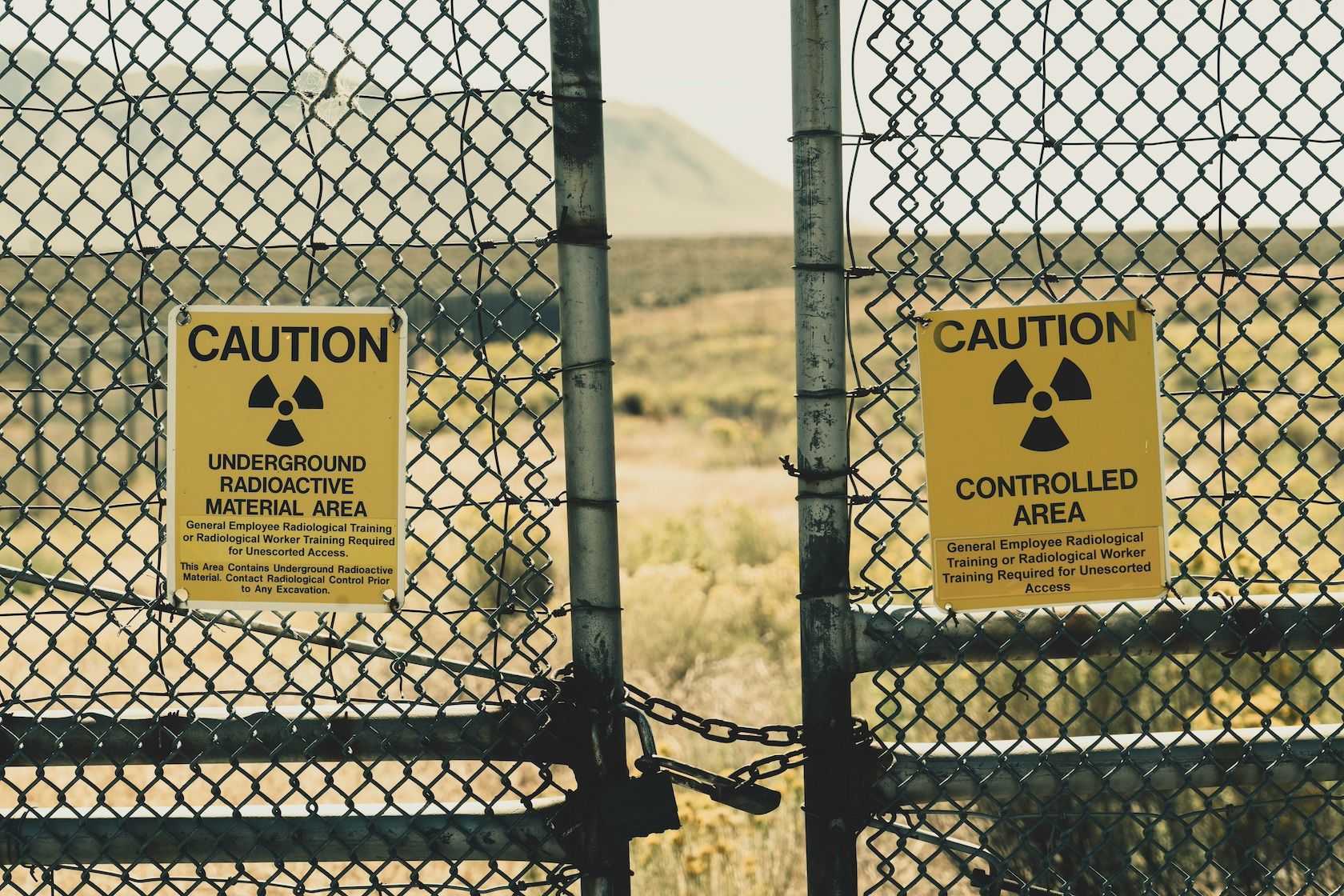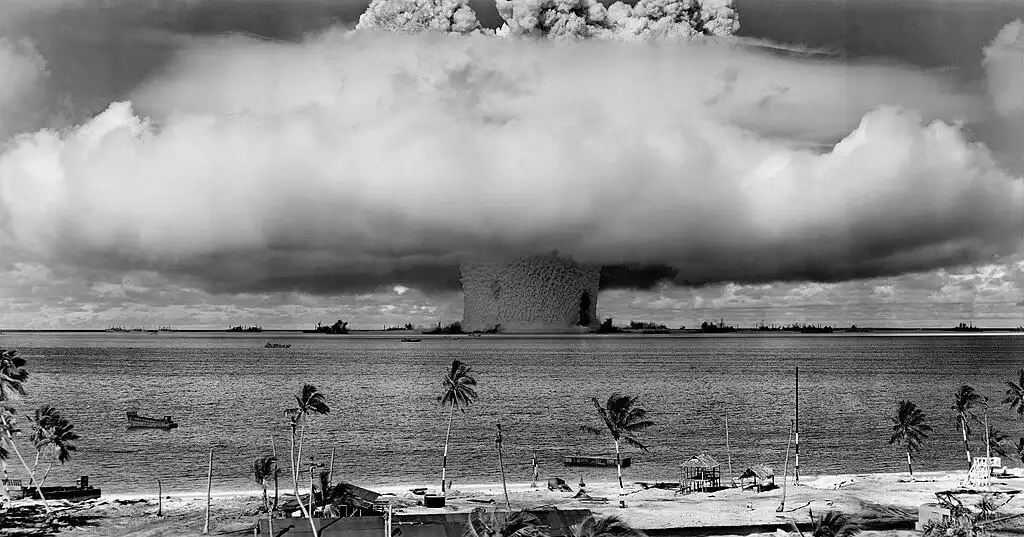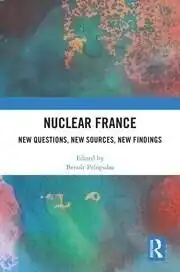Home>Global nuclear politics and history in light of independent scholarship.

17.07.2024
Global nuclear politics and history in light of independent scholarship.
Interview with Benoît Pelopidas
On the occasion of the publication of Nuclear France by Routledge this year, we take a look at the main results of the research presented in the book with the director and founder of the Nuclear Knowledges programme, Benoît Pelopidas. We also answer the key question: Why is it important to have independent research on this subject, and what are the implications?
In January this year you published Nuclear France, the result of several years' research as part of the Nuclear Knowledges programme. Could you remind us why it is important to carry out independent fundamental research on the nuclear issue today?
Let’s make it clear from the outset that independent research is not a subjective label, and that it can be defined by clear and verifiable practices.
First, the strict rejection of research funding carrying conflicts of interest, which translates into refusing funding from stakeholders of the nuclear enterprise or activists in favour of denuclearisation. It should be pointed out straight away that most of the funding supporting the programme is not only French, European, American, public, or private but all of the above. What distinguishes it is that it is based on peer review free from conflicts of interests. The ERC funding (1,5 million euros), which accounts for half of the funds raised to date, is also not earmarked.
Second, the refusal to use the categories of actors’ discourse as analytical categories. For example, the national nuclear arsenal is not "the deterrent" (la dissuasion); to call it this would be tantamount to assuming that it is deterring and, that that is all it is doing and that no other capability could produce that effect, without providing any evidence of those claimed effects. Another common mistake to be avoided, which is visible in the acceptance of using the “deterrent” as a shorthand is to treat evidence of intent on the part of policy promoters as evidence of the policies’ effects.
This fundamental and independent research is essential for four reasons, beyond the obvious observation that such scholarship simply applies to the nuclear field a result that has been established wherever anyone has asked the question about the effects of research funding based on conflicts of interests on policy analysis. Funding by bodies with a conflict of interest biases the analysis in favour of the real or perceived interests of the funder. Think of the tobacco industry funding cancer research, or the fossil fuel industry funding energy research. In the nuclear field, the question has never been asked, but it is assumed that we already know the answer and that it is different. Once the research is done, we discover that this assumption is wrong. It is not different. Direct censorship, self-censorship and filtering effects have now been documented.

Quite apart from the fact that the war in Ukraine was made possible by the Russian leadership’s belief that nuclear threats would shield them from direct intervention by the Western powers, and that spending on nuclear weapons is now at its highest level since the Cold War, there are at least four reasons why independent nuclear research is essential today:
- It enables an informed choice, when the public justifications for nuclear arsenals do not match the postures and the armaments deployed. Let's take two examples: nuclear policies are often presented as “protection” policies in nuclear-armed states, which is reflected in the common metaphor of the nuclear “umbrella”—the purpose of the umbrella is not to prevent rain but to shelter us when it falls. In fact, nuclear weapons are incapable of doing that. On the contrary, security strategies relying on them take our vulnerability and the absence of any possible protection against a deliberate, accidental, or “inadvertent” nuclear strike as a starting point, and gamble that a certain type of threat will convince the most hostile adversary not to strike, and that no catastrophic nuclear event affecting the country will occur. The second example of inadequate justification is “deterrence”. This is how French and British strategists refer to national arsenals. Yet research has shown that in the American and Soviet cases, the arsenals are far in excess of the requirements of nuclear deterrence as defined by their respective staffs. Secondary missions such as “damage limitation” should deterrence fail explain the size of these arsenals and make weapons located on our territory priority targets. Research in France and the UK has also shown that the arsenals deployed historically are not determined by a quest for “deterrence” but by many other factors. Independent scholarship thus makes it possible to offer citizens an informed choice about their possible futures, with coherent justifications. It diagnoses and overcomes the illusion of an absence of alternatives. To do so, it clarifies the memories of the past, imagined futures, and value judgements that govern each policy choice. This is where scholarship differs from activism, either recognized as such or not.(1) The purpose of scholarship is not to advocate a particular policy but to enable choice between consistently justified alternatives.
- The effects of the nuclearisation of the world are underestimated due to a lack of independent research. Independent research has been able to document three underestimated effects: the environmental and health effects of nuclear testing;(2) the fact that we have avoided nuclear explosions by luck and not because we have perfectly controlled the arsenals; and the fact that policies to develop nuclear arsenals degrade the quality of democracy by creating pockets of secrecy and lack of accountability. Such effects, which are visible in a rapidly changing world due to climate change and the collapse of biodiversity, remain to be further studied now that independent scholarship has crafted a methodology to do so.
- Elected representatives and citizens are not aware of these results and therefore reason and make their choices on the basis of incorrect or incomplete information about the effects of the nuclearisation of the world. We found this through Europe-wide surveys conducted in 2018 and 2019, which we are currently replicating, and interviews with elected representatives.
- After seven years of the Nuclear Knowledges programme, independent scholarship has shown that it is possible, fruitful, and uniquely capable of adequately answering these questions—otherwise these results would have been established decades ago. This is an encouragement to our colleagues to integrate nuclear realities into their thinking, rather than assuming that the effects of the nuclearisation of the world are either insignificant or unknowable. This encouragement also invites methodological innovation and rigor to become able to ask questions which do not fit within the confines of disciplinary boundaries.
What are the main results of the research carried out by the Nuclear Knowledges research group and presented in the book Nuclear France ?
As I explain in detail in the preface, the book aims to make two main contributions in a context where there is no unofficial history of France’s relationship with nuclear technology in English that goes beyond the usual civil-military divide. In this context, the book proposes new answers to new questions about the overall history of nuclear France, based on unpublished archives, interviews, and surveys in several countries; secondly, it aims to defend and illustrate the ethos, method, and possible results of independent research.
It provides answers to the following questions: What shaped the first generation of the French nuclear arsenal? Does the evidence available in the archives of allied and enemy states support the grand Gaullist narrative? What are the health and environmental consequences of the nuclear tests in Polynesia? How can we judge the accuracy of the official measurements of the consequences of these tests? How was the location of these tests decided? What was France's proliferation and non-proliferation policy, beyond the already documented cooperation with Israel and Iraq? What has France's policy toward the Iranian nuclear programme been since the 1970s? How did the methods of regulating nuclear accidents evolve after the Cold War? Is it correct to speak of a French “consensus” on the policy of nuclear deterrence?(3)

The available answers to these questions are too often based exclusively on French archives or a priori accept the assumptions of strategic rationality or those of nuclear deterrence theory. These limitations have led to a hasty acceptance of the idea that the French nuclear arsenal became credible in the 1960s, based on French sources expressing a desire for credibility, and because the disciplinary limitations of diplomatic history do not allow for a technical assessment of the arsenal's performance. The idea of a grand strategy has also too often been accepted without checking whether the stated intentions have actually led to the construction of matching capabilities. This state of research has also led to the assertion that there is a consensus in France on nuclear deterrence policy, based on surveys carried out by MINARM’s(4) communication department, whereas surveys carried out by independent researchers paint a very different picture. This problem is exacerbated by the fact that the study of the contestation of French nuclear policy mostly focuses on contestation abroad.(5)
In order to assess the validity of common misconceptions about various aspects of French nuclear policy, the contributors to this volume have mobilised relevant and unusual primary sources, both in France and abroad. They have drawn on various types of French sources—private and local archives—as well as British, American, Indian, South African, Iranian, and international primary sources. In addition, interviews and surveys were conducted with a representative sample of the French population in 2018 and 2019. Computer modelling of the trajectory of the radioactive clouds produced by the French nuclear tests is also providing new data that can be used for future research.
This interdisciplinary effort has led to the surprising results summarised in this book, which includes all the team's contributions on France and adds a preface that includes previously unpublished archives for a renewed critique of the idea of nuclear consensus in France. They show that:
1) The first generation of France’s nuclear arsenal was not technically credible, despite foreign assistance. Many French officials knew this, as did their allies and enemies.
2) The French search for uranium in the 1960s took place on a very large geographical scale.
3) French strategic cooperation with foreign nuclear programmes went beyond the well-known cases of Israel and Iraq. We mobilise French, Indian, and South African primary sources to document French contributions to the nuclear programmes of both India and South Africa.
4) The hijacking of the Iranian nuclear issue by “strategists” at the expense of “regionalists” within the French diplomatic service has led to a rewriting of Franco-Iranian relations that paints a false picture of France’s role in the genesis of the 2015 nuclear deal (JCPOA - Joint Comprehensive Plan of Action).
5) The French government had plans to test nuclear weapons in Corsica in 1960, which were successfully opposed. This chapter also explains the limits of the arguments put forward by protest groups and notes the lack of solidarity with the populations exposed to the tests in Algeria and Polynesia.
6) Following a July 1974 nuclear test during which the bomb detonated at a different altitude than planned, around 110,000 people, or 90% of the population of French Polynesia at the time, were exposed to doses of radioactivity that entitle them to compensation under French law.
7) Safety regulations in the electro-nuclear sector underwent fundamental changes after the Cold War, standardising the idea that a nuclear accident was manageable.
Thank you for your questions and thanks to the contributors to the book: Matthew Adamson, Valerie Arnhold, Austin Cooper, Anna Konieczna, Sébastien Philippe and his co-authors, Jayita Sarkar, and Clément Therme.
Interview by Miriam Périer, CERI.
- Access the website, the work of the Nuclear Knowledges programme in open access and the team’s X account.
- Access the presentation of the book Nuclear France on the publisher’s website (Routledge)
Book review
"During the Cold War, France's nuclear behavior persistently baffled and enervated other Western national security policymakers. Yet in the English-language scholarship on Cold War nuclear history, France has received less attention than any other traditional great power. This excellent collection of essays by up-and-coming scholars goes a long way toward piercing the fog of myth and misperception that continues to obscure the complex truth about France's nuclear actions and their consequences."
Jacques E. C. Hymans, University of Southern California, USA
Illustrations
Photo 1: Forbidden radioactive space, photo by Dan Meyers for Unsplash
Photo 2: Operation Crossroads Baker, United States Department of Defense (either the U.S. Army or the U.S. Navy) Derivative work: Victorrocha. Public domain, via Wikimedia Commons
Notes
- 1.It is important to observe here that pro-nuclear activism often presents itself as neutral expertise but adopts the language of the official discourse and all too often validates assertions without adequate evidence.
- 2.See the chapter co-authored by Sébastien Philippe in Nuclear France.
- 3.The roundtable H-Diploorganised in English about my book Repenser les choix nucléaires already offers evidence of the absence of meaningful “consensus” about nuclear weapons policy in France. See https://issforum.org/ISSF/PDF/RJISSF-Roundtable-15-17.pdf
- 4.Ministère des armées.
- 5.Jean Allman, “Nuclear Imperialism and the Pan-African Struggle for Peace and Freedom: Ghana, 1959–1962,” Souls 10: 2 (2008) ; Mervyn O’Driscoll, “Explosive Challenge: Diplomatic Triangles, the United Nations, and the Problem of French Nuclear Testing, 1959–1960,” Journal of Cold War Studies 11:1 (2009); Vincent Intondi, African Americans against the Bomb: Nuclear Weapons, Colonialism, and the Black Freedom Movement (Stanford, CA: Stanford University Press, 2015), pp. 45–61.
(credits: Dan Meyers pour Unsplash)
Follow us
Contact us
Media Contact
Coralie Meyer
Phone : +33 (0)1 58 71 70 85
coralie.meyer@sciencespo.fr
Corinne Deloy
Phone : +33 (0)1 58 71 70 68
corinne.deloy@sciencespo.fr
